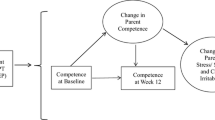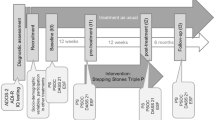Abstract
This community-based study examined the influence of early teaching interventions on children diagnosed with Autistic Spectrum Disorders, and the dynamics between the time intensity of the interventions and parenting stress, on child outcomes. Intellectual, educational, and adaptive behavior and social functioning were all measured. Sixty-five children were divided into four groups, based on the levels of time intensity of their intervention, and on their parents’ stress levels. There were gains in intellectual, educational, and adaptive behavioral and social skills, and there was a positive relationship between the time intensity of the early teaching interventions and child outcome gains. More importantly, however, high levels of parenting stress counteracted the effectiveness of the early teaching interventions.


Similar content being viewed by others
References
Baxter, C., Cummins, R. A., & Yiolitis, L. (2000). Parental stress attributed to disabled family members: A longitudinal study. International Journal of Disability Research, 25, 105–118.
Bitsika, V., & Sharpley, C. (1999). An explanatory examination of the effects of support groups on the well-being of parents of children with autism: I: General counselling. Journal of Applied Health Behaviour, 1, 16–22.
Bitsika, V., & Sharpley, C. (2000). Development and testing of the effects of support groups on the well-being of parents of children with autism-II: Specific stress management techniques. Journal of Applied Health Behaviour, 2, 8–15.
Blacher, J., & McIntyre, L. L. (2006). Syndrome specificity and behavioural disorders in young adults with intellectual disability: Cultural differences in family impact. Journal of intellectual and Developmental Disabilities, 50, 184–198.
Bouma, R., & Schweitzer, R. (1990). The impact of chronic childhood illness on family stress: A comparison between autism and cystic fibrosis. Journal of Clinical Psychology, 46, 722–730.
Carlson-Green, B., Morris, R. D., & Krawiecki, N. (1995). Family illness predictors of outcome in pediatric brain tumors. Journal of Pediatric Psychology, 20, 769–784.
Charman, T., Howlin, P., Berry, B., & Prince, E. (2004). Measuring developmental progress pf children with autism spectrum disorder on school entry using parent report. Autism, 8, 89.
Connor, M. (1998). A review of behavioural early intervention programmes for children with autism. Educational Psychology in Practice, 14, 109-117.
Dale, E., Jahoda, A., & Knott, F. (2006). Mothers’ attributions following their child’s diagnosis of autistic spectrum disorder: Exploring links with maternal levels of stress, depression and expectations about their child’s future. Autism, 10, 463–479.
Dawson, G., & Osterling, J. (1997). Early intervention in autism: Effectiveness, common elements of current approaches. In M. J. Guralnick (Ed.), The effectiveness of early intervention: Second generation research (pp. 307–326). Baltimore: Brookes.
Deater-Deckard, K. (1998). Parenting stress and child adjustment: Some old hypotheses and new questions. Clinical Psychology: Science and Practice, 5, 314–332.
Dumas, J. E., Wolf, L. C., Fisman, S., & Culligan, A. (1991). Parenting stress, child behaviour problems, and dysphoria in parents of children with autism, down syndrome, behaviour disorders, and normal development. Exceptionality, 2, 97–110.
Dunn, M. E., Burbine, T., Bowers, C. A., & Tantleff-Dunn, S. (2001). Moderators of stress in parents of children with autism. Community Mental Health Journal, 37, 39–52.
Dyson, L., Edgar, D., & Crnic, K. (1989). Psychological predictors of adjustment by siblings of developmentally disabled children. America Journal on Mental Retardation, 94, 292–302.
Eisenhower, A. S., Baker, B. L., & Blacher, J. (2005). Preschool children with intellectual disability: Syndrome specificity, behaviour problems, and maternal well-being. Journal of Intellectual Disability Research, 49, 657–671.
Eldevik, S., Eikeseth, S., Jahr, E., & Smith, T. (2006). Effects of low-intensity behavioral treatment for children with autism and mental retardation. Journal of Autism and Developmental Disorders, 36, 211–224.
Elliot, C. D., Smith, P., & McCulloch, K. (1996). British ability scales II. Windsor: NFER Nelson.
Engwell, P., & Macpherson, E. (2003). An evaluation of the NAS earlybird programme. Good Autism Practice, 4, 13–19.
Friedrich, W. N., Greenberg, M. T., & Crnic, K. (1983). A short-form of the questionnaire on resources and stress. American Journal of Mental Deficiency, 88, 41–48.
Gilliam, J. E. (1995). Gilliam autism rating scale. Austin, TX: Pro-Ed.
Harris, S. L. (1984). The family of the autistic child: A behavioral systems view. Clinical Psychology Review, 4, 227–239.
Harris, S. L. (1994). Treatment of family problems in autism. In E. Schopler, & G. B. Mesibov (Eds.), Behavioral issues in autism (pp. 161–175). New York: Plenum.
Harris, S. L., Handleman, J. S., Arnold, M. S., & Gordon, R. F. (2000). The Douglass developmental disabilities center: Two models of service delivery. In J. S. Handleman, & S. L. Harris (Eds.), Preschool education programs for children with autism (2nd ed., pp. 233–260). Austin, TX: Pro-Ed.
Hastings, R. P. (2002). Parental stress and behaviour problems of children with developmental disability. Journal of Intellectual and Developmental Disability, 27, 149–160.
Hastings, R. P., & Johnson, E. (2001). Stress in UK families conducting intensive home-based behavioral intervention for their young child with autism. Journal of Autism and Developmental Disorders, 31, 327–336.
Hastings, R. P., & Symes, M. D. (2002). Early intensive behavioral intervention for children with autism: parental therapeutic self-efficacy. Research in Developmental Disabilities, 23, 332–341.
Hodapp, R. M., Fidler, D. J., & Smith, A. C.M. (1998). Stress and coping in families of children with Smith Magenis syndrome. Journal of Intellectual Disability Research, 42, 331–340.
Honey, E., Hastings, R. P., & McConachie, H. (2005). Use of the questionnaire on resources and stress (QRS-F) with parents of young children with autism. Autism, 9, 246–255.
Howard, J. S., Sparkman, C. R., Cohen, H. G., Green, G., & Stanislaw, H. (2005). A comparison of intensive behavior analytic and eclectic treatments for young children with autism. Research in Developmental Disabilities, 26, 359–383.
Keohane, D. D. (1997). A functional relationship between teachers’ use of scientific rule governed strategies and student learning. Doctoral Dissertation.
Koegel, R. L., Schriebman, L., Loos, L. M., Dirlich-Wilheim, H., & Dunlap, L. (1992). Consistent stress profiles in mothers of children with autism. Journal of Autism and Developmental Disorders, 22, 205–216.
Kuloglu-Aksaz, N. (1994). The effect of informational counseling on stress level of parents of children with autism in Turkey. Journal of Autism and Developmental Disorders, 24, 109–110.
Lecavalier, L., Leone, S., & Wiltz, J. (2006). The impact of behaviour problems on caregiver stress in young people with autism spectrum disorders. Journal of Intellectual Disability Research, 50, 172–183.
Lovaas, O. I. (1987). Behavioral treatment and normal educational functioning in young autistic children. Journal of Consulting and Clinical Psychology, 55, 3–9.
Lovaas, O. I., & Smith, T. (2003). Early and intensive behavioral intervention in autism. In A. E. Kazdin, & J. R. Weisz (Eds.), Evidence-based psychotherapies for children and adolescents (pp. 325–340). New York: Guilford.
Magiati, I., & Howlin, P. A. (2001). Monitoring the progress of preschool children with autism enrolled in early intervention programmes: Problems in cognitive assessment. Autism, 5, 399–406.
Mudford, O. C., Martin, N. T., & Bibby, P. (2001). Parent-managed behavioral treatment for preschool children with autism: Some characteristics of UK programs. Research in Developmental Disabilities, 22, 173–182.
National Research Council. (2001). Educating children with autism. Canada: Committee on Educational Interventions for Children with Autism.
Olson, C. L. (1979). Practical considerations in choosing a MANOVA test statistic. Psychological Bulletin, 83, 579–586.
Osborne, L. A., & Reed, P. (2007). The relationship between parental stress and behaviour problems of children with autistic spectrum disorders receiving early teaching interventions. Under review.
Ozonoff, S., & Cathcart, K. (1998). Effectiveness of a home program intervention for young children with autism. Journal of Autism and Developmental Disorders, 28, 25–32.
Perry, A., Sarlo-McGarvey, N., & Factor, D. C. (1992). Stress and family functioning in parents of girls with Rett syndrome. Journal of Autism and Developmental Disorder, 22, 235–248.
Pisula, E. (2004). Stress and depression in mothers and the behavior of children with autism in the strange situation. Przeglad Psychologiczny, 47, 291–304.
Reed, P., Osborne, L. A., & Corness, M. (2007). Relative effectiveness of different home based behavioral approaches to early teaching intervention. Journal of Autism and Developmental Disorders, 37, 1815–1821.
Robbins, F. R., Dunlap, G., & Plienis, A. J. (1991). Family characteristics, family training, and the progress of young children with autism. Journal of Early Intervention, 15, 173–184.
Rogers, S. J. (1998). Empirically supported comprehensive treatments for young children with autism. Journal of Clinical Child Psychology, 27, 168–179.
Sallows, G. O., & Graupner, T. D. (2005). Intensive behavioral treatment for children with autism: Four-year outcome and predictors. American Journal on Mental Retardation, 110, 417–438.
Schopler, E., Reichler, R., Bashford, A., Lansing, M., & Marcus, L. (1990). Psychoeducational profile (rev.). Austin, TX: Pro-Ed.
Sparrow, S., Balla, D., & Cicchetti, D. (1990). Vineland Adaptive Behavior Scales. CirclePines American Guidance Service.
Stores, R., Stores G., Fellows, B., & Buckley, S. (1998). Daytime behaviour problems and maternal stress in children with down syndrome, their siblings, their non intellectually disabled and other intellectually disabled peers. Journal of Intellectual Disability Research, 42, 228–237.
Weiss, M. J. (2002). Hardiness and social support as predictors of stress in mothers of typical. children, children with autism, and children with mental retardation. Autism, 6, 115–130.
Wolf, L. C., Noh, S., Fisman, S. N., & Speechley, M. (1989). Brief report: Psychological effects of parenting stress on parents of autistic children. Journal of Autism and Developmental Disorders, 19, 157–166.
Acknowledgements
We would like to acknowledge the kind participation of the children and their parents in this research, and we thank them very much for their time. Thanks are due to the Local Education Authorities who participated. We would also like to thank Mark Corness for his work in assessing the children. This research was funded by a grant from the South East Regional Special Educational Needs Partnership (SERSEN) to the last author. Some of these data were first presented at the Second Conference for the European Association for Behaviour Analysis (EABA) in Gdansk 2005.
Author information
Authors and Affiliations
Corresponding author
Rights and permissions
About this article
Cite this article
Osborne, L.A., McHugh, L., Saunders, J. et al. Parenting Stress Reduces the Effectiveness of Early Teaching Interventions for Autistic Spectrum Disorders. J Autism Dev Disord 38, 1092–1103 (2008). https://doi.org/10.1007/s10803-007-0497-7
Received:
Accepted:
Published:
Issue Date:
DOI: https://doi.org/10.1007/s10803-007-0497-7




